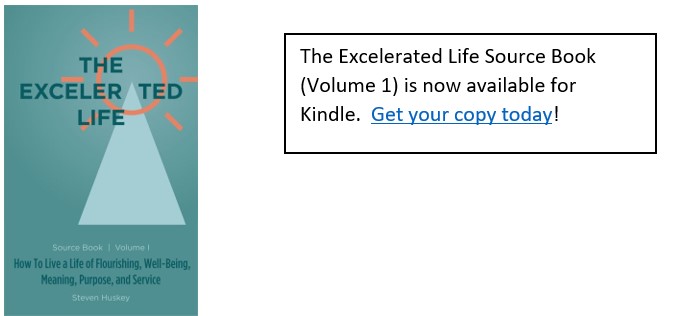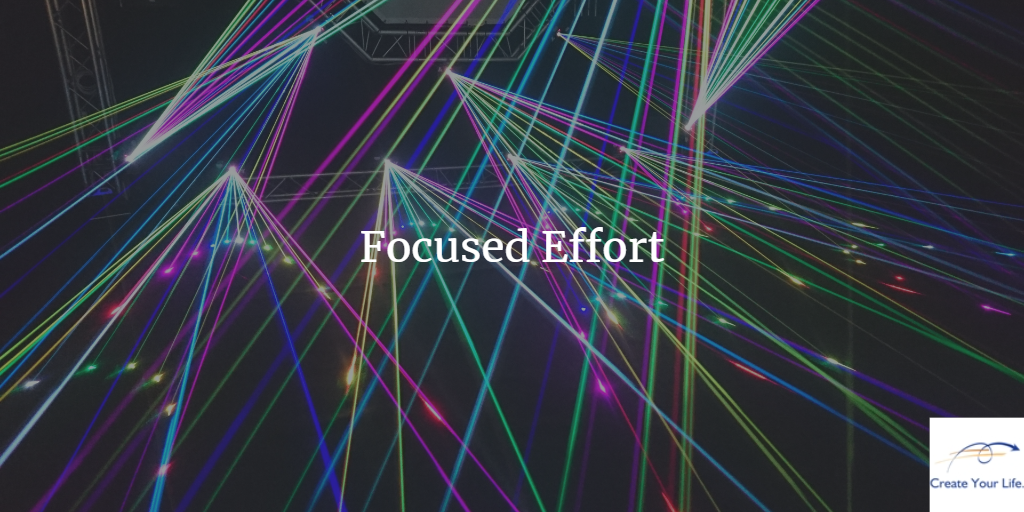This isn’t a dress rehearsal, this is your life. Your time here is finite and you must choose the things on which you want to focus your efforts. Otherwise, your precious time will be frittered away on unimportant things OR on important things that aren’t your important thing. Focused effort makes the difference.
Flashlight or Laser?
When I was a young boy, I got a magnifying glass. I was a budding butterfly collector and I used the magnifier to study my specimens. I quickly learned that there was another, vastly more entertaining use of the magnifying glass. I discovered that you could focus the sun’s rays through the glass and it would get really hot. You could burn your skin. You could ignite paper. I had a great time, burning my hand and my friends’ hands and starting small fires. I even did some clumsy (and quite inartistic) wood burning and I was fascinated by the fact that I could burn wood using just a glass and the sun. What I didn’t understand then but have since come to know is the power of focus.
I’m sure you’ve used a flashlight. A flashlight is useful in the dark, but its light is diffuse, scattered. There isn’t much power behind it. You probably haven’t used a laser unless you’re in a specialized field but lasers are used for a number of functions, from cutting through metal to reading CDs to bar code scanning to delicate surgeries, and a good deal more. The basic idea behind a flashlight and a laser are similar. “Excited” atoms release energy as photons of light. The difference is that, in the flashlight, the energy is released randomly, while in a laser, the light – or energy – is extremely focused. The flashlight gives off a nice light but the focused laser cuts through steel. The difference is the power of focus.
The Need for Focused Effort
“Clarity accounts for probably 80% of success and happiness. Lack of clarity is probably more responsible for frustration and underachievement than any other single factor.” ~ Brian Tracy
Why do you need focused effort? For one thing, your time here is finite, so to do one thing requires that you sacrifice all the other things you could have done. If you don’t stop to think about what you are sacrificing, your time will fill by default with trivial things because they didn’t have to pass the focus test of being more important than other things. [Burkeman] Focus on your most important efforts is necessary to prevent all those trivial tasks from sneaking in and taking over all your time.
In The Earned Life, Marshall Goldsmith writes that this book is “written at a moment in my life when I still haven’t done all I want to do, but I’m running out of time. So I have to make choices.” Where ever you or I fall on the continuum of our lives, like Goldsmith, we are both running out of time.
Oliver Burkeman, writing in Four Thousand Weeks: Time Management for Mortals, tells us that, if we live for 80 years, we’ll have about 4000 weeks (or 4160 weeks by my calculation) to do whatever we came here to do. Even if you live till 90, you’ll only have 4680 weeks. Now that may sound like a lot of time, but consider how many of those weeks you’ve already used up. In my case, I’ve lived out 3671 of my weeks. Meaning if I live to be 90 (and I actually plan to live much longer than that but we’ll see), I have 1009 weeks left. Yikes! Some of us have more, some have less, but we all have a finite amount of days or weeks. Without focus, much of your finite time will be taken up by trivial things that are not that important to you in the long run.

The Benefits of Focused Effort
Here is an experiment for you. For this experiment, you’ll need a cardboard box (a cereal box is perfect), a spoon, and a knife. First, take the spoon and stab it through the cardboard box. How did that work? Now, pick up the knife. Stab it through the box. How did that work?
Most people find that it is difficult, if not impossible, to stab a spoon through a cardboard box. On the other hand, most people find it fairly easy to stab a knife through the box. The blunt spoon diffuses your efforts, making them essentially useless in terms of slicing through the box. However, all your effort is focused by the knife through its sharp tip, making it easy to slice through the cardboard. The difference is focus.
To begin to focus your efforts, take some time to consider what is essential for you, what will enable you to live your purpose. Once you become crystal clear about what you want to accomplish (or in a more spiritual sense, what you came here to accomplish), it is easier to align your goals with your purpose.
Before you begin the process of setting a goal — an act that improves your focus — you must be absolutely clear about what you want to achieve. Otherwise, you may diffuse your energy by spreading yourself too thin over too many projects or end up striving for something you don’t really care about. Harnessing the power of focused effort is like swapping the spoon for the knife to stab through a cardboard box.
You’ve Got To Decide
“Wanting everything is almost the same as wanting nothing,” says Joshua Becker, and wanting to do everything is almost like wanting nothing. If you don’t decide what to focus on, you’re using a flashlight when you could be using a laser.
Perhaps you’ve heard of FOMO – the fear of missing out? We want to replace that with JOMO – the joy of missing out. [Burkeman] If you didn’t have to decide what to miss out on, then the things you decide to do can’t mean that much. Wanting to do everything is almost like wanting nothing.
The core challenge of deciding what to focus on is how to decide what to leave out, what not to do.
But staying focused isn’t only about identifying those trivial tasks you didn’t want to do in the first place. It also entails letting go of some really attractive things you do want in favor of the one or two things that move you towards your major definite aim or goal.

Clarify for Focused Effort
“It’s alluring to try to alleviate the anxiety of having too many responsibilities or ambitions by getting started on them all at once, but you’ll make little progress that way; instead, train yourself to get incrementally better at tolerating that anxiety, by consciously postponing everything you possibly can, except for one thing.” ~ Oliver Burkeman
As we have discussed many times, (see here, here, or here, for example) you will always have too much to do, more than you’ll ever get done.
So the first thing is to practice acceptance. “You have to accept that there will always be too much to do,” wrote Oliver Burkeman, “that you can’t avoid tough choices or make the world run at your preferred speed.”
Once you accept the fact that you aren’t ever going to do everything you want to do or need to do, you can begin to focus your efforts on the few things that are most important to you. Those things that only you can do, that you are uniquely qualified for, that allow you to live into your purpose and give your best in Service to the world.
Of course, you still have to wash the dishes and make the bed and do all the little things but you’ll also be focusing your limited time on the things that matter to you. Otherwise, you might never get to them. But once you clarify your aims, as Burkeman says, “You get to spend your finite time focused on a few things that matter to you, in themselves, right now, in this moment.”
Align Actions with True Desires
So, where do you shine the light of your focused attention and efforts? Here are some questions to ask and answer to help you get clarity of purpose. (If you don’t have a journal yet, this would be a good place to start.)
- If I could accomplish only one thing, what would it be?
- What is something I am not doing now that I want to start doing?
- What is something I am doing now that I want to stop doing?
- What are my top 5 strengths? What could I do to use these more consistently?
- What do my friends say I am good at?
- What makes me angry? (By this, I mean “righteous indignation”.) What injustice do I see in the world that I want to make better?
- After I am dead, what do I want to be remembered for?
Employing Excelerated Focus™
“What is it you plan to do with your one wild and precious life?” ~ Mary Oliver
This is it, you know. This isn’t a dress rehearsal or waiting around for the real show to start. This is your life. Will you fritter it away in a futile attempt to do all the things? Or will you instead choose to live out an answer to this question from Joshua Becker: “If you were to die today, what one thing would you be most disappointed that you weren’t able to complete?”
What’s your one thing? How could you get started on that today? How will you spend your “one wild and precious life?” Will you focus on the one or two important things? That’s how you embrace your Excelerated Life™!
What one great thing would you dare to do if you knew you could not fail?
What small step could you take to begin that mission?
Share your thoughts by leaving a comment below.
Excelerated Focus™ — aligning your actions with your true desires — is one step in creating your Excelerated Life™, a life of flourishing and well-being, and a life of meaning, purpose, and service.
Read more about the Excelerated Life™.
Resources:
Becker, Joshua. Things That Matter. New York: WaterBrook, an imprint of Random House, a division of Penguin Random House LLC, 2022.
Burkeman, Oliver. Four Thousand Weeks: Time Management For Mortals. New York: Farrar, Straus and Giroux, 2021.
Goldsmith, Marshall and Mark Reiter. The Earned Life: Lose Regres, Choose Fulfillment. New York: Currency, an imprint of Random House, a division of Penguin Random House, LLC. 2022.


